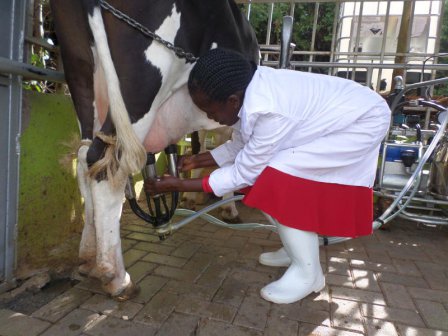When she retired from politics to try her hand at growing cattle feed, Nelly Sum had no inkling how successful the venture would be. Sum, a former councillor at the defunct Nandi County Council, now supplies fodder to leading agrovets in Eldoret town and dairy farmers.
Initially, she did not have her own dairy cows. She started by growing Nandi Seteria at her farm in Ngechek, Nandi County, in 2002. Seteria is a variety of grass that is highly sought by dairy farmers in the region. “My pasture production was thriving. I could harvest Nandi Seteria, crash it into fine form and package it in 18kg bags, selling each at Sh300.
I sold between 200 and 300 bags within six months,” says Sum. She also harvested, packaged and sold pasture seeds to dairy farmers at Sh700 per kilogramme. Sum’s business would soon gain the admiration of her sons and daughters who wondered why she was producing the best feeds for dairy cows yet she was not a milk producer.
Following consultations in September last year, the family resolved to put up a unit housing 20 hybrid dairy cows so that the former civic leader could try milk production. A family friend living in Israel sent them pictures of a model dairy farm and they chose to construct one using that design. Sum then bought the first batch of three inbreed dairy cows from a breeder in Nakuru at Sh150,000 each.
Within the same month, 10 other grade cows were bought and her business kicked off on a high note. Despite her age, she was determined to make it in dairy farming. She ensured there was adequate feeds and a conducive environment for optimum production.
“Within the first month, three cows calved. Each produced 26 litres of milk per day. I am now in my third month in this business and I am currently getting an average of 110 litres each day and production is increasing by the day,” Sum says. Earnings from the venture have been improving since December when she started selling the first milk produce in bulk.
The dairy farm, she said, generated Sh58,000 last month. “The project is still in its initial stage. I supply milk produce to Lelchego, a farmers’ co-operative society that collects produce before selling it to processors. I deliver 50 litres in the morning and another 60 litres in the evening,” said Sum.
She also reserves several litres for her calves and for consumers within her locality. “I could have ventured into dairy farming earlier rather than join politics. We have to, however, appreciate the fact that there is always time for everything,” she says.
Some of her friends have been questioning her decision to establish a dairy farm at her age. “Unlike during my time in politics when we could travel out or host delegations at home, dairy farming is peaceful because I am always busy in my farm supervising the progress of my dairy cows,” she says.
The farmer sells her milk produce to the co-operative at Sh26 per kilo because it purchases in bulk. Lelchego also meets the cost of transport since it buys at the door step. Locals buy her milk at Sh40 per kilo. Sum is in the process of registering the business as a company, which she will jointly own with her four sons and two daughters.
“We have concluded the process of making this project a family company so that each member becomes a shareholder. After registration, we will invest in value addition for better income,” she says. Part of her immediate plans going forward is to acquire a store for her produce and install a milk vending machine in Eldoret or Kisumu towns. They also intend to convert surplus milk into yoghurt.
Gilbert Kosgei, one of Sum’s sons, says they have just made the last payments for the certificate for the company. Kosgei says the project has been on a steady growth since December and hailed his mother for effective management of the agri-business venture.
“We will expand the project and enhance value addition so that we produce finished products,” he says. A total of Sh. 2.3 million was used to purchase the dairy cows and another Sh1 million to put up the cow shed. Apart from generating income, Sum says the project has been motivational. Monthly meetings to review performance of the venture have also encouraged family bonding.
“We are now thinking wider and want to expand and attain a target of 20 grade cows, improve productivity before seriously investing in value addition for products,” she says. Apart from the pasture generated from her own farm, she buys supplementary animal feeds, including dairy meal, cotton seed, sunflower and sorghum, to boost milk production.
Hers is a modern dairy farm with good facilities, including piped water, electricity, a milking machine and office and storage space, with four employees manning it. The employees help her run the farm by routinely checking up on the health of the dairy cows, keep records and the general care of the dairy.
“Being busy within my compound, a good income and employment of the youths within the catchment region are some of the benefits that encourages me in this dairy project,” says Sum. Her calves, most of them bulls, will be ready for sale within a period of two years.
She, however, identifies the high cost of animal feed and AI services as some of the challenges facing the sub-sector. “We sometimes source some animal feed supplements from the neighbouring Uganda where it is cheaper then we mix it with pasture,” she says.

